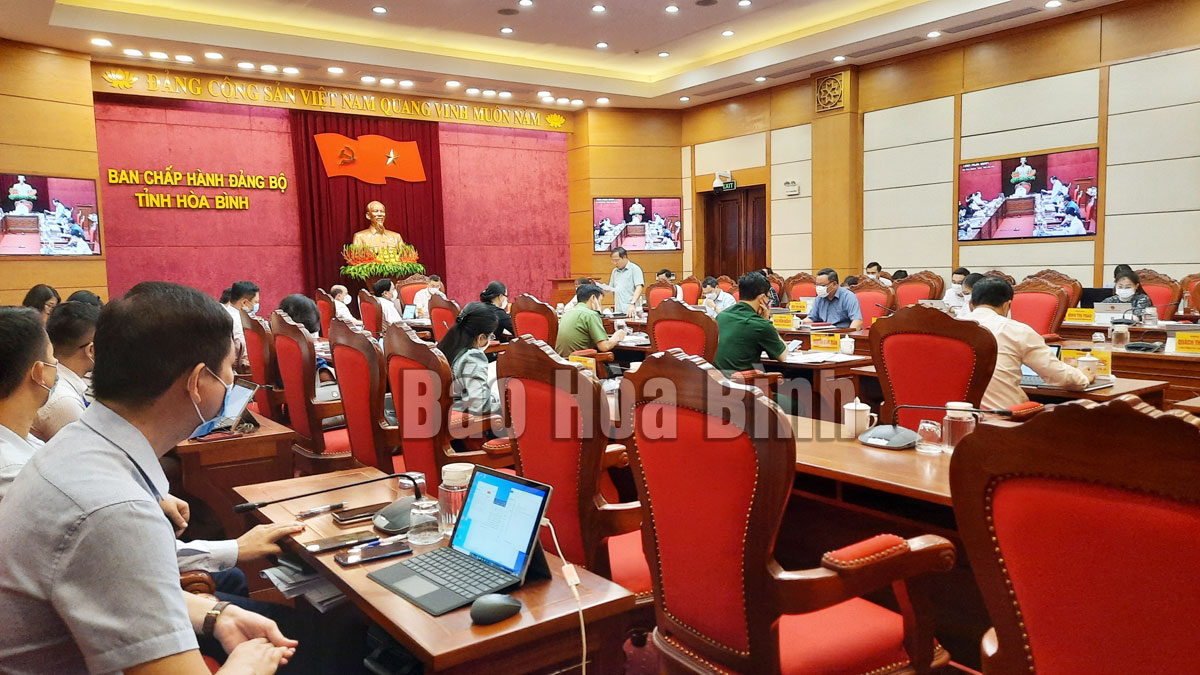
(HBO) - A meeting of the Standing Board of the Hoa Binh Provincial Party Committee was successfully held in the "paperless” form in early August.

Photo: A meeting of the Standing Board of the Hoa Binh Provincial Party Committee held in the "paperless” form in early August.
The meeting fulfilled the target of reducing the number of
printed papers, thus saving money and cutting down the preparation time. The
quality of the meeting was improved, and leaders were able to make decisions in
a timely, swift and accurate manner.
The method has contributed to administrative reform toward the building of the
e-administration in line with the integration trend and regulations of COVID-19
prevention and control.
The model was jointly developed by the Vietnam Posts and
Telecommunications Group (VNPT) and Viettel Military Industry and Telecoms
Group. All of the process will be held via the e-document system.
Prior to meetings, the agenda and documents will be prepared,
reviewed, approved and updated onto the system to give participants time to
study. Participants can access many relevant documents at the same time via
smart devices like computers, tablets and smartphones.
In addition, the method offers functions such as a map of the meeting room,
registration to voice opinions, participant management, voting and virtual
signing ceremony, which help the chairperson run the meeting effectively.
Realising the importance of the Fourth Industrial Revolution
(4IR) and ICT application in the management of agencies and organisations, the
Office of the provincial Party Committee proposed that the Party Committee and
its Standing Board carry out the "paperless” meeting method to reduce the
number of hard copies so as to save costs and quickly update information,
contributing to administrative reforms in the operation of the Party
Committee.
The move also improves the working manner and process, as well
as operations of Party organisations towards the building of the e-administration
and gradually meeting requirements of the 4IR and international integration. It
is expected to raise the quality and efficiency of meetings of Party
organisations in the province.
Moreover, the method supports the holding of urgent meetings for
security-political issues, socio-economic development and disasters, among
others, helping local leaders quickly give frequent and constant instructions
during incidents./.
The Standing Board of the Hoa Binh provincial Party Committee has agreed in principle on a proposal by the Standing Board of the Party Committee of Hoa Binh city to gather feedback on the city’s 1:2000 zoning plan, which forms part of its broader urban development strategy.
Hoa Binh province has made notable progress in public administration reform and digital government development, with the satisfaction index among citizens and businesses reaching over 84%, according to recent government evaluations.
Thanks to great efforts by local authorities in recent times, the governance and public administration performance of Mai Chau district has been significantly improved.
In the afternoon of June 6, the Party Committee, the People's Council, the People's Committee and the Fatherland Front of Lac Son district solemnly held a meeting to celebrate the 139th anniversary of the district's founding (1886–2025) and the 79th anniversary of the establishment of the district's Party Committee (1946–2025). There was the attendance of Mr. Bui Van Thang, the Vice Chairman of the Provincial People's Council; Mr. Quach Tat Liem, the Vice Chairman of the Provincial People's Committee; Ms. Dang Bich Ngoc, the Deputy Head of the National Assembly Delegation of the province; as well as the former leaders of the province and district through various periods, who are the natives of the district.
Implementing the Politburo’s Resolution No. 57-NQ/TW on breakthroughs in science – technology, innovation, and digital transformation is a golden opportunity for the northern mountainous province of Hoa Binh to renew growth model, improve competitive edge and shorten digital gap.
Resolution 57-NQ/TW, issued by the Politburo on December 22, 2024, identifies sci-tech, innovation, and digital transformation as strategic breakthroughs to build a developed and prosperous nation. In Hoa Binh province, this spirit is not just a slogan, it’s being put into action through concrete initiatives that form a "new development triangle”: digital citizenship, digital economy, and digital administration.



